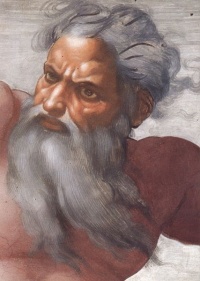Divinity
From The Art and Popular Culture Encyclopedia
(Difference between revisions)
| Revision as of 17:24, 27 July 2010 Jahsonic (Talk | contribs) ← Previous diff |
Revision as of 09:33, 5 November 2013 Jahsonic (Talk | contribs) Next diff → |
||
| Line 1: | Line 1: | ||
| + | [[Image:God.jpg|thumb|right|200px|Detail of [[Sistine Chapel]] fresco ''[[Creation of the Sun and Moon]]'' by [[Michelangelo]] (completed [[1512]]).]][[Image:Birth of Venus Botticelli.jpg|right|thumb|200px|''[[The Birth of Venus (Botticelli)|The Birth of Venus]]'' (detail), a [[1486]] painting by [[Sandro Botticelli]]]] | ||
| {{Template}} | {{Template}} | ||
| '''Divinity''' and '''divine''' (sometimes "the Divinity" or "the Divine") are broadly applied but loosely defined terms, used variously within different faiths and belief systems — and even by different individuals within a given faith — to refer to some transcendent or [[transcendence (religion)|transcendental]] power, or its attributes or manifestations in the world. The root of the words is literally "godlike" (from the Latin ''deus'', cf. ''[[Dyaus Pita|Dyaus]]'', closely related to Greek ''[[zeus]]'', ''[[Daeva|div]]'' in [[Persian language|Persian]] and ''[[Deva (Hinduism)|deva]]'' in [[Sanskrit]]), but the use varies significantly depending on which [[Deity|god]] is being discussed. This article outlines the major distinctions in the conventional use of the terms. | '''Divinity''' and '''divine''' (sometimes "the Divinity" or "the Divine") are broadly applied but loosely defined terms, used variously within different faiths and belief systems — and even by different individuals within a given faith — to refer to some transcendent or [[transcendence (religion)|transcendental]] power, or its attributes or manifestations in the world. The root of the words is literally "godlike" (from the Latin ''deus'', cf. ''[[Dyaus Pita|Dyaus]]'', closely related to Greek ''[[zeus]]'', ''[[Daeva|div]]'' in [[Persian language|Persian]] and ''[[Deva (Hinduism)|deva]]'' in [[Sanskrit]]), but the use varies significantly depending on which [[Deity|god]] is being discussed. This article outlines the major distinctions in the conventional use of the terms. | ||
| - | |||
| - | For academic or professional uses of the terms, see [[Divinity (academic discipline)]], or [[Anglicanism#Anglican divines|Divine (Anglican)]] | ||
| - | |||
| == See also == | == See also == | ||
| + | * [[Catholic Concept of the Divine]] | ||
| + | * [[Christology]] | ||
| * [[Deity]] | * [[Deity]] | ||
| * [[Ho'oponopono]] (Morrnah section) | * [[Ho'oponopono]] (Morrnah section) | ||
| * [[List of deities]] | * [[List of deities]] | ||
| - | * [[Theosis]] | + | * [[Divinization (Christian)|Theosis]] |
| {{GFDL}} | {{GFDL}} | ||
Revision as of 09:33, 5 November 2013
|
Related e |
|
Featured: |
Divinity and divine (sometimes "the Divinity" or "the Divine") are broadly applied but loosely defined terms, used variously within different faiths and belief systems — and even by different individuals within a given faith — to refer to some transcendent or transcendental power, or its attributes or manifestations in the world. The root of the words is literally "godlike" (from the Latin deus, cf. Dyaus, closely related to Greek zeus, div in Persian and deva in Sanskrit), but the use varies significantly depending on which god is being discussed. This article outlines the major distinctions in the conventional use of the terms.
See also
- Catholic Concept of the Divine
- Christology
- Deity
- Ho'oponopono (Morrnah section)
- List of deities
- Theosis
Unless indicated otherwise, the text in this article is either based on Wikipedia article "Divinity" or another language Wikipedia page thereof used under the terms of the GNU Free Documentation License; or on research by Jahsonic and friends. See Art and Popular Culture's copyright notice.


